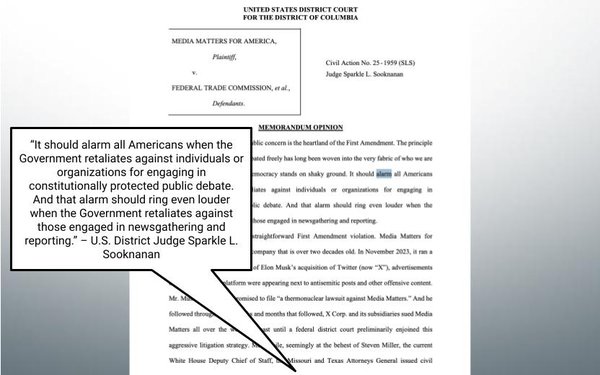
Handing the
Federal Trade Commission a defeat, a federal judge has blocked the agency from attempting to force the advocacy group Media Matters to turn over information relating to its critical reporting about
ads on X, formerly Twitter.
In a ruling issued late Friday, U.S. District Court Judge Sparkle Sooknanan in Washington, D.C. found that Media Matters is likely to prove that the
FTC acted with "retaliatory animus" and that its civil investigative demand (comparable to a subpoena) therefore violates the First Amendment.
"Speech on matters of public
concern is the heartland of the First Amendment," Sooknanan wrote in a 48-page opinion granting Media Matters' request for a preliminary injunction agains the FTC.
"It should alarm all Americans
when the government retaliates against individuals or organizations for engaging in constitutionally protected public debate," she added. "And that alarm should ring even louder when the government
retaliates against those engaged in newsgathering and reporting."
advertisement
advertisement
The ruling comes in a legal battle that began in June, when Media Matters sued the FTC over its demand for a
host of information -- including all documents relating to the Interactive Advertising Bureau, World Federation of Advertisers and its now defunct Global Alliance for Responsible Media, Check My Ads,
the Center for Countering Digital Hate, Double Verify and NewsGuard, among other groups.
Media Matters alleged that the demand marked a "fishing expedition into the most
sensitive areas of Media Matters’ journalism and advocacy."
The group alleged the FTC undertook the probe in retaliation for a November 2023 report that ads for Apple,
Bravo, IBM, Oracle and other brands were being placed next to pro-Nazi posts on X.
After Media Matters published its study, it was sued by X and served with subpoenas by two
state attorneys general -- Ken Paxton of Texas and Andrew Bailey of Missouri.
Media Matters is fighting X's lawsuit, and also sued to halt the attorneys general
investigations.
A federal judge in Washington blocked Paxton's investigation, ruling that Media Matters was likely to show that Paxton was retaliating against the group for
newsgathering activity that's protected by the First Amendment. That ruling was upheld by the D.C. Circuit Court of Appeals last month.
Bailey abandoned his probe before a judge issued a ruling.
Media Matters alleged in its complaint against the FTC that in May, several months after Republican Andrew Ferguson took over as chair, the agency demanded material connected to X's
lawsuit, documents regarding Media Matters' finances and newsgathering, and information regarding its affiliations with other ad organizations and watchdogs.
The FTC asked
Sooknanan to dismiss Media Matters' complaint, arguing the group's lawsuit was premature because the agency hadn't gone to court to enforce its demand for information.
Sooknanan rejected that
position.
"Nothing in the FTC Act suggests that Congress meant to declare open season on journalists by allowing a retaliatory FTC to decide if and when its retaliation will be
reviewed by a federal court," she wrote.
The agency also said it didn't specifically target Media Matters, arguing that the group was among numerous organizations to receive
demands for information regarding "potentially unlawful advertising boycotts."
Media Matters responded in court papers filed earlier this month that the FTC didn't explain why
it believed the group would have counters in its new "meaningful, relevant evidence" regarding an advertising boycott.
The watchdog also made the broader argument that the
FTC's current campaign against what it characterizes as "advertiser boycotts" is actually "a politically motivated response to protected speech."
FTC Chair Ferguson "has made
clear that, in targeting what he calls 'advertiser boycotts,' he is actually concerned about content moderation advocacy (i.e., protected speech) and independent economic decisions made by advertisers
who do not want their ads appearing next to extremist content (i.e., lawful business decisions)," Media Matters wrote earlier this month.